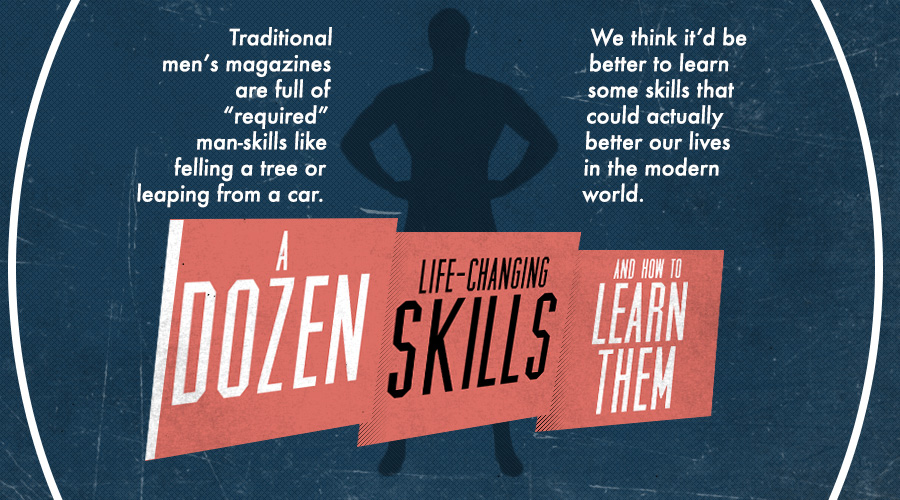Throughout our lives, we’re subject to a lot of tests that turn out to be completely irrelevant. Knowing how long the shadow of a tree will be in three hours as the sun sets is impressive (seriously), but the odds someone will hold you hostage and make you do a little calculus to win your freedom are fairly low.
Our days outside the classroom and office demand more. The life skills we learn help us get through the mundane quickly and effectively. They also help us experience everything we can in any given situation.
And while there are myriad skills and proficiencies to master, here are a dozen that can actually change your life.

1. How to Quit Something You Don’t Want To
With how busy everyone is nowadays, it’s hard to prohibit yourself from doing something that gives you instant joy. As I write this, I’m on week three without cigarettes. (Not nicotine, I’m on the patch).
But I didn’t want to quit. I enjoyed smoking, the feeling it gave. The mental release it triggered and the ability to just get away.
But I had to quit. I obviously didn’t “care” enough about my health to quit for the sake of my lungs, but every other part of my character didn’t agree with it.
You have to have a real reason to quit something you love—something that’s more deeply rooted in your being than pleasure. For me it was the fact that I care about nature and hate seeing cigarette butts everywhere.
A lame reason to everyone else? Yes. But to me, it was more than enough.
Experts at the Mayo Clinic have a multi-faceted approach (to quit smoking), but there’s a lesson we can all internalize and gain strength from. Some life lessons on quitting:
- Always—always—think about why you’re quitting what you’re quitting
- Join a support group (even if it’s just online support)
- Talk to friends and family members you trust
- Run, lift, pull out some weeds—do anything to get the blood flowing and better your health
- Avoid situations that make you want to do the thing you’re quitting

2. How to End a Conversation
Sometimes, smiling and nodding while slowly walking backward out of the door just isn’t enough.
Let’s think about this clinically: We’ve all been the person who wants to end the conversation. The longer it goes, the more awkward it becomes. The more awkward it becomes, the higher the chances that it could go sideways quickly. It’s in everybody’s best interest if you’re being honest about it. Not honest like “This is really uninteresting, so I’m going to leave” honest, but ending a conversation when it should end.
Feel the conversation out and cut it when there’s a break in the dialog. After laughter tapers off from a joke, for instance.
Forbes has a great piece on professionally ending conversations gracefully that are just the right balance of politeness and firmness. The key is to tailor your dialogue based on the situation. If you’re in a social setting, tell the person you need to meet and greet others. Maybe you need to get back to eating at a restaurant.
If anything, you can make a conscious effort to make it seem like it’s your schedule’s fault for cutting the conversation short. Ask how to get in contact afterward (if you truly want to)—and then do it.
You also might be surprised at how well a handshake and, “Well, it’s been great talking to you,” works at politely terminating the encounter.

3. How to Make Small Talk
Although it might seem strange, small talk isn’t necessarily a 100 percent visceral, on-the-fly kind of conversation. The keys here are to practice. Always keep a few topics you can talk about (current events, sports, not the weather), and actually know about them.
And, maybe most importantly, ask open-ended questions. That way you won’t get stuck with the “Fine” answer to the ole “How are you doing?”
Indiana University Southeast’s Shyness Research Institute (It’s real—click the link) breaks it down into five steps:
- Setting talk — make a comment about something!
- Introduce yourself
- Feel out for a topic of discussion
- Expand a topic interesting to both you and the other person
- End it (be sure to mention that you’re grateful for the conversation).
That’s it. Now get out there and practice!
4. How to Master Fear of Rejection
Rejection happens. Seriously. If you’re batting 1,000, you’ve most likely only been up once. Whether it’s in the business world or in the dating realm, rejection and the fear of it should never trump your sense of adventurousness and wonder.
The “what-if” question. That stupid, omnipresent “Do you ever want to live wondering ‘what-if’?” question. But it’s true.
Ask yourself what the worst-case scenario reallyis in any given situation. And although it’s a modified form of setting the bar low, it should also give you the ability to just go out there and do it.
It’s nearly impossible to not want to belong, according to the American Psychological Association (in a more eloquent way, of course). But it’s the pain—strangely—that teaches us a lesson. It teaches us perseverance. That life goes on, guys. And that’s the most important part to remember. You may never see the person who rejected you ever again.
What’s there to lose?

5. How to Use Photoshop
By this point, needing to know your way around Photoshop is on par with requisite Microsoft Word knowledge. Whether putting together a banner for your office, touching up a photo you’re giving as a gift, or simply “enhancing” your online dating profile pics, the ability to manipulate and create images is incredibly important in our culture. I’ve been “shopping” things for years now, and although my knowledge of shortcuts isn’t up to par to, say, a designer, my ability to put faces on things is unmatched.
There’s only one real tool you need to start: the magnetic lasso. By being able to select things accurately (and cut, re-tone, blur, whatever), you can do mostly anything.

If you haven’t signed up for Lynda.com—it’s a great site, really—check out their tutorial here.
When it comes to editing photos, a couple settings come into mind. My fiancée is a professional photographer (I think putting googly eyes and faces on things is sacrilege to her), and according to her, “Curves” and “Levels” are two of the most important and powerful things Photoshop can do. You can make blacks blacker, colors more vibrant, wash out the grays, anything.
Curves, levels, and the magnetic lasso.
6. How to Listen (Really Listen)
A conversation is more than just keeping up. When you listen to things—actually remember small, passing details—you become a more thoughtful conversation partner. You can bring things up in later conversations (subsequent dates, for instance) and become, quite possibly, the greatest gift giver of all time.
Because if you actually listen to people, it shows that you care. And that’s really one of the best gifts you can give. This Wall Street Journal piece can help get you started. In it, Julian Treasure, an author and speaker—and also host of a TED Talk—breaks it down into four parts: receive (pay attention), appreciate (show visually that you’re paying attention), summarize (repeat what’s being said) and ask questions afterward to show you understood it all.
7. How to Speak in Front of People
Be excited. Know your material. Don’t rely on slides.
Know that it takes a little time to get used to if you’re not always doing it. So says TED talker Susan Cain, at least.
And she should know—as someone who doesn’t like the attention of public speaking (i.e. an introvert doing a TED talk.
Perhaps most importantly, you can read your audience, Cain asserts. You’re on a sometimes metaphorical pedestal, and you’ve got the attention of everyone. Don’t waste it. Speak as though you’re having a conversation with each and every person, and you’re golden.

8. How to Make Healthy Foods Delicious
Whether it’s chicken, rice, or vegetables, healthy foods don’t have to be bland. Even if you’re stuck with some microwave-in-bag veggies, a little mustard and vinaigrette can make anything delicious.
With that, also look into healthy alternatives to favorites. Pureed cauliflower instead of mashed potatoes, spaghetti squash instead of spaghetti. Olive oil has good fat and adds a savory, full taste to anything. Because if there’s one thing about healthy foods, they mostly all absorb flavors readily.
Little dashes of garlic powder (or even just sautéed garlic) and other spices and herbs like rosemary and oregano can do wonders for alternatives like quinoa.
This is also a good time to mention that you don’t have to cook rice with water. Like the sweet, sweet creamy gold that is risotto, try cooking your rice with chicken stock. It’s a meal in itself!
If you find yourself staring at the chicken breasts in your refrigerator, you don’t have to settle for grilling every single one. A mustard sauce—which is tasty, tangy, and actually OK to slather on—will do it wonders: Mix up some Dijon mustard with a little olive oil and some freshly chopped herbs. That’s it. It’s creamy and brings out the succulence of baked chicken like nothing else.
Looking for more? Primer has a ton of stuff on food and cooking.
9. How to Stop Living Passively and Set Goals
As long as you’re breathing, your life isn’t over. It doesn’t stop after 25. Or 35 or 40. In fact, one of my coworkers’ mother apparently did the math and found it to be cheaper to cruise every day than live in a retirement home.
The future is just as important today as it was in high school. Only now you’re financially stable, you can rent a car, and really, the future is brighter than you might have imagined 10 years ago. Think about what you want today, tomorrow, next month, next year, and beyond—and as an adult, you have the power to actually attain them.
Psychologist Will Meek breaks it down into 12 steps (classic, I know). Here are the highlights for those looking to get into the meat:
- Write everything and anything in terms of what you want to achieve
- Be realistic
- Be specific
- Set a timeline and flowchart (what do you need to get there?)
- Start. Dominate.
Not too bad, is it? The thing is, with these five steps, you’ll be able to set goals for today just like you would within the next 15 years. It’s a simple process with incredibly potent results.

10. How to Recognize and Defeat Negative Thinking
When you don’t do something because you fear rejection (if that’s the case, see number four above), when you think you’re unworthy of something, and when you worry about something that’s likely not going to happen, nothing good will come of it.
Negative thinking can be pervasive. It can be malignant and take over our minds and change our default mindset to wondering why we even try. So why do we try?
We try because it’s all we can do.
Defeating negative thinking is about perseverance. It’s easy to succumb and do nothing. It’s harder to swim upstream and hope, no matter what, that you’re going to make it to the end. And, really, that’s what we’re all swimming toward in the grand scheme of things. No matter what method or unit of measurement you use to appraise the value of your self, you will be better for having tried.
Psychiatrist and physician Daniel G. Amen writes for the American Holistic Health Association that you have to be impartial. Firstly, you have to be able to recognize that you’re having a thought that is defeatist in nature.
Write them down. Write all of these thoughts down and seriously analyze them. Speak to these thoughts when you see them written on paper. Seeing negative thoughts—no matter how “dramatic” you may think they are—physically, in front of you, gives you something to fight.
With these negative thoughts written in front of you, approach it as a problem just like you did in school. And just like that omnipresent question about when two trains would (tragically) collide when they left their respective cities going their respective speeds, solve it. You got laid off from a job? It sucks. It can bring you down for a bit, but it also means that the hunt for something bigger and better is on.
Perhaps the hardest thing to realize is just because you think something, doesn’t make it true. Take these negative thoughts and create counter-arguments for why they’re not true. You’ll be surprised by all of the emotional alternatives that exist, and how your immediate, automatic thoughts may not represent reality.
Turn negative thoughts into obstacles and spin them into a challenge. It’s natural to have visceral, so-called knee-jerk thoughts after something happens, but the trick to defeating negative thinking is seriously applying your own logic against yourself. What does that mean? Take a step back from your situation, assess it and look at all the alternatives in terms of how you process it.
No matter how bad the situation, you can forge ahead. Remember that—because life is about going forward.
11. How to Nurture a Friendship and Not Just Participate
Staying in contact with people nowadays is easier than ever before. Seriously. Remember the good old days when away messages were still a thing and you might just sit there for a few minutes and wait for your best friend to get back to the computer so you can start or continue a conversation?
Know this: Friendships and friends grow with us over time. We may still feel like kids when we’re around our best friends, but things have changed: We still laugh as easily, but we laugh at different things. Bumming $20 for a CD is now $200 or more for rent. The concept is always the same, but the scenarios are different.
Nurturing a friendship is about recognizing that change and helping it move along any which way it goes. Recognize your friends’ plights and victories and sympathize or revel accordingly.
Anything else is just participating.
Especially in post-college friendships, where people are scattered across the country, you must make time for catch-up phone calls, as well as plan weekends to see each other once or twice per year. If you don’t, one day you’ll realize you haven’t spoken to your best friend for 5 years.
Once again, we turn to the Mayo Clinic to learn how to nurture a friendship. Take all of these tips as they are written. They are seriously important and simple enough to be summed up in two words:
- Accept yourself
- Accept others
- Be positive
- Don’t compete
- Listen up
- Respect boundaries
I’ve been friends with the same two people for more than half my life. We’ve continued the friendship across the country.
12. How to Let Go
Letting go is hard. I’m honestly still struggling with this one, but I do know what I need to do.
You have to forgive. You don’t have to forget, but you do have to forgive. Or at least come close to it. Letting go is something of a misnomer in that sense. It’s coming to terms with something—loss—that came about from for any reason a human could come up with.
You don’t have to agree with something to let it go. You just have to accept it for what it is and move on. Empathy is a mark of a mature mind, and every single person has demons he or she has to face. Some far darker and malevolent than others.
Odds are you know the person well—well enough that something they did hurt you deeply enough that you have to “let it go.” Whether it causes you to bristle with rage or weep, letting go is difficult.
Dr. John M. Grohol sums up this monstrous feat in five steps on his site PsychCentral (which is an awesome site if you can get over the 3D word art kind of elements):
- Decide to let go: You’re taking a big step and moving past something you could have been feeling for years. It’s OK if you need time.
- Get it out: Say something. Write something. Purge yourself of every little detail regarding the thing you’ve been holding in. It is also important to realize that you yourself are responsible in some part, too.
- Stop being the victim.
- Stay present: Not “letting go” is, in essence, leaving some part of yourself in the past—and no one benefits from that.
- Forgiveness: You don’t have to necessarily shake hands, hug and party, but to successfully move on, you have to let it go.
I myself am almost there—maybe two fingers left until it’s finally gone. I’m just not sure if I’m ready to see it go.















![It’s Time to Begin Again: 3 Uncomfortable Frameworks That Will Make Your New Year More Meaningful [Audio Essay + Article]](https://www.primermagazine.com/wp-content/uploads/2025/01/begin_again_feature.jpg)


